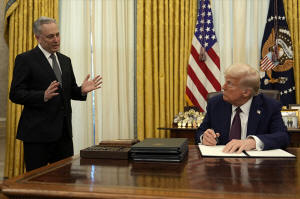Emboldened crypto industry seeks to cement political influence and
mainstream acceptance
 Send a link to a friend
Send a link to a friend
 [February 18, 2025] By
ALAN SUDERMAN [February 18, 2025] By
ALAN SUDERMAN
When the Trump administration’s crypto czar, David Sacks, recently held
a news conference to announce a new congressional working group to
advance cryptocurrency regulation, many digital asset enthusiasts were
unimpressed and underwhelmed.
“There were a lot of people on X who felt like this wasn’t, you know, a
mind-blowing announcement,” Sacks said on a podcast a few days later,
referring to the social media outlet formerly known as Twitter. But
Sacks said having the White House and key members of Congress committed
to passing key crypto legislation in the next year, possibly within six
months, was worth celebrating. “We’ve never had that before, so that is
pretty monumental,” he said.
Sacks’ defensiveness highlights a new reality in Washington: After
spending heavily to help elect Trump and other crypto-friendly
lawmakers, the industry is emboldened, impatient and eager to cement its
influence in politics and mainstream financial systems.
“Time is critical,” Ji Hun Kim, president and acting CEO at the Crypto
Council for Innovation said at a recent House committee hearing titled:
“A Golden Age of Digital Assets: Charting a Path Forward.”
The crypto industry has scored some early wins since Trump took office,
including the repeal of an accounting rule by the U.S. Securities and
Exchange Commission and an executive order by the president directing a
working group to study and propose changes to crypto regulations as well
as the possible formation of a strategic government reserve of
cryptocurrencies within 180 days.

As the industry calls for more substantive action, some crypto companies
are looking to exert their influence by trying to punish old enemies.
Tyler Winklevoss, co-founder of the crypto exchange Gemini, said his
firm won’t hire any MIT graduates as punishment for the school rehiring
former SEC Chairman Gary Gensler to teach classes.
“Not even interns for our summer intern program,” Winklevoss said on X.
The move came after Coinbase’s CEO announced his firm wouldn’t work with
any law firms that hired any of Gensler’s former deputies who’d
committed “bad deeds” toward the crypto industry. The Gensler SEC was
the most aggressive financial regulator in trying to police the crypto
industry.
Congress has held several hearings in recent weeks where crypto
supporters have aired grievances over how they were treated during the
Biden administration, particularly around how regulators allegedly
forced banks to cut ties with crypto companies.
And new Republican leadership at the SEC has criticized the agency’s
past performance under Gensler and promised a new day, while making it
clear that day won't be tomorrow.
“It took us a long time to get into this mess,” SEC Commissioner Hester
Peirce, who is leading a new crypto task force, said in a lengthy
statement on the agency’s website. “Please be patient.”
The SEC recently asked a federal court to pause ongoing litigation
against Binance, the world’s largest cryptocurrency exchange, because
leadership is now rethinking previous enforcement actions.
[to top of second column] |

President Donald Trump listens to White House adviser David Sacks as
he signs an executive order regarding cryptocurrency in the Oval
Office of the White House, Thursday, Jan. 23, 2025, in Washington.
(AP Photo/Ben Curtis, File)
 Sacks and crypto-friendly lawmakers
expect two pieces of legislation to become law. One would set
regulations and reserve requirements for issuers of stablecoins, a
type of crypto that’s exploded in popularity and whose value is
typically tied to the dollar or other traditional currencies.
The other piece of legislation aims to set clear rules for how
crypto exchanges and other companies operate, as well as decide
which digital assets are regulated as securities, like stocks, and
which should be considered commodities, like gold or oil. Securities
generally face stricter regulations.
Similar legislation has stalled in past years but many in the crypto
industry expect broad, bipartisan support for passage this time.
That’s due in part to the heavy political spending by the crypto
industry. Fairshake, the crypto super PAC that was one of the
biggest spenders in last year’s election, said recently it has
already amassed a huge war chest for next year’s midterms. One of
the crypto industry's biggest wins last year was helping knock off
former Sen. Sherrod Brown, a Democrat from Ohio and crypto critic
who led the Senate's banking committee.
“The Democrats have gotten the message,” said crypto investor
Anthony Scaramucci, who briefly served as communications director
during Trump’s first term, “They don’t want to be in the 2026
campaign having a crypto army against them.”
Just like crypto prices, the industry’s popularity and influence are
prone to wild upswings and falls. A few years ago, the Super Bowl
was packed with celebrities doing commercials for crypto companies
and mogul Sam Bankman-Fried had easy access to the top halls of
power.
That popularity and influence waned after Bankman-Fried’s company
collapsed amid massive criminal fraud, a market meltdown and other
scandals -- before roaring back with Trump’s victory.
But while showing a united front for the election, debates over the
crypto legislation and other policy proposals risk exposing fault
lines among the industry's many different tribes and strong and
eccentric personalities.
The CEO of Ripple, for example, caused waves when he said he’d like
to see a U.S. government reserve of crypto include multiple digital
assets rather than bitcoin, the world’s most popular cryptocurrency.
The idea is a nonstarter for many bitcoin diehards.
And a new report from JPMorgan highlighted how some of the proposals
in the stablecoin legislation related to how those coins hold
reserves could pose a “significant challenge” to Tether, the world’s
largest stablecoin.
The CEO of Tether, which recently relocated to crypto-friendly El
Salvador, responded on social media by disputing the bank’s findings
and calling its analysts “salty.”
All contents © copyright 2025 Associated Press. All rights reserved |